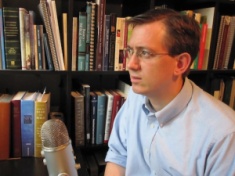If you follow me, you know I talk a lot about the importance of recognizing genre in scripture: podcast here, Sperry symposium here, posts here, here, etc.
Evolution is also a topic I address with some frequency, such as here (a BYU guest lecture) and here (in context of “what prophets know”).
I also talk a lot about Genesis, how and why it’s historically been misread (e.g. my presentation here and accompanying post here), as well as the parallels in Moses and Abraham (see here for my FAIR talk transcript, and here for a fireside video.)
And I’m writing a book on Genesis 1 where I tie a lot of this stuff together… but I’ve left a lot of hardest writing for last, including my chapter on the temple. So, let’s talk. Continue reading










 I presented a short paper at the Joseph Smith Papers conference a few weeks ago, a spin-off from my Genesis 1 manuscript. (I presented an expanded version at the
I presented a short paper at the Joseph Smith Papers conference a few weeks ago, a spin-off from my Genesis 1 manuscript. (I presented an expanded version at the
Recent Comments